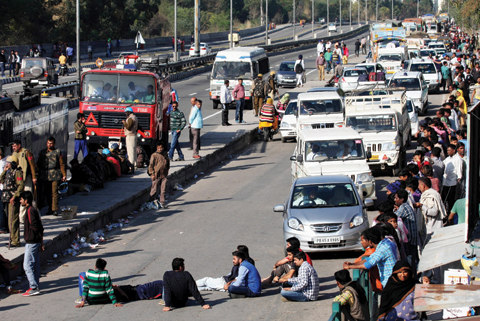 CHANDIGARH: Indian residents from the Jat community block the Chandigarh-Shimla highway amid violent caste protests in Panchkula yesterday.—AFP
CHANDIGARH: Indian residents from the Jat community block the Chandigarh-Shimla highway amid violent caste protests in Panchkula yesterday.—AFPROHTAK, India: Ten people have died in caste protests which triggered widespread arson and looting in a north Indian state, police said yesterday, as New Delhi faced a water crisis after mobs shut down a key supply.
Thousands of troops with shoot-on-sight orders were deployed on Saturday in Haryana state, a day after week-long protests turned violent with rioters setting fire to homes and railway stations and blocking highways. Ten people have been killed and about 150 injured in the state since Friday when officers fired on rioters, Haryana police chief Yash Pal Singal told a press conference, updating earlier estimates of five dead.
The Jat caste is leading the protests, demanding quotas for government jobs and university places, saying they are struggling to find employment and education opportunities despite India's strong economic growth.
India reserves places for lower castes in measures intended to bring victims of the country's worst discrimination into the mainstream. But the policy causes resentment among Jats, a rural caste which owns farms, and among other communities, who say it freezes them out.
Protesters again took to the streets overnight despite the stepped-up security, torching shops in Haryana's Rohtak district which is the epicentre of the violence, a local police officer told AFP.
"There were clashes during the night across the district. Over a dozen buildings were set on fire by protesters, with incidents of looting of shops and ATMs at two places," the officer said on condition of anonymity. A local police officer in Jhajjar, whose district borders that of Rohtak, earlier told AFP that five people were killed on Saturday "when the army opened fire on a mob".
Water crisis
As the crisis escalates, the Indian capital's water supplies have been hit after mobs forced the shutting of sluice gates at a canal in Haryana which takes water to the capital's treatment plants. More than 16 million people in India's capital are facing a major water crisis as a result of the violent demonstrations. The protesters have damaged equipment that brings water from Munak canal in Haryana state to New Delhi, depleting the capital's water supply. New Delhi gets about 60 percent of its water
from the neighboring state.
After holding emergency meetings, Delhi Chief Minister Arvind Kejriwal announced water rationing throughout the city, and said schools would be closed today to conserve supplies. "Water to be equally rationed amongst all. Pl save water. Schools closed tomo," Kejriwal said on Twitter.
Talks aimed at ending the violence were set to be held later Sunday in Delhi between Jat leaders, including those involved in the protests, and national Home Minister Rajnath Singh.
"We are working on immediately ending the violence," national Jat leader Yashpal Malik, who will take part in the talks, told AFP. Protesters maintained blockades of roads into Haryana despite the impending talks, television footage showed. Hundreds armed with sticks halted vehicles along one key route which was also blocked with fallen trees, an AFP photographer reported.
The photographer saw at least a dozen gutted buildings including a school in the town of Sampla five kilometres (three miles) from Rohtak city.
One of India's largest carmakers, Maruti Suzuki, suspended operations at its two Haryana plants after the protests disrupted supplies of components, a spokesman said.
Hundreds of trains in the state have also been cancelled or diverted since Friday, an official said. "Ten small and big railway stations have been burnt. The mobs set fire to rail engines and bogies," railways spokesman Neeraj Sharma said.
A senior local police officer warned the situation was tense in Jhajjar as Jat protesters kept up their agitation. "We are not in control. The situation is very tense as thousands of protesters are on roads encircling the main administrative area in the town," Jhajjar police chief Rajiv Kumar said. - Agencies









